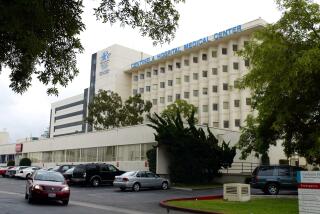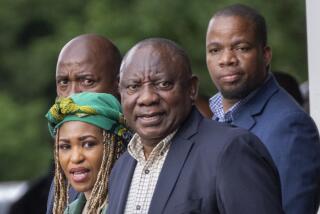Doctors’ Work in S. African’s Death Decried
- Share via
PRETORIA, South Africa — Two government doctors who treated black activist Steve Biko before his death in police custody eight years ago were found guilty Friday of disgraceful and improper conduct.
The South African Medical and Dental Council’s disciplinary committee found that the two physicians, both white, had failed to provide adequate care for Biko, who died on the floor of a prison cell here Sept. 12, 1977, from brain and internal injuries. An inquest had earlier concluded that these injuries were suffered during police interrogation on security charges.
Biko, 30 when he died, was the spokesman of the black consciousness movement and a potential national leader. His death provoked international outrage over apartheid, South Africa’s system of racial separation, and made him a martyr in the fight against white minority rule.
One of the doctors, Benjamin Tucker, the chief district surgeon for Port Elizabeth at the time of Biko’s death, was found guilty of 10 counts of disgraceful professional conduct in failing to examine Biko properly and in allowing the security police to move him, lying naked in the back of a police van and without a medical attendant, 750 miles by road from Port Elizabeth to a prison hospital in Pretoria.
Failed to See Wound
The other doctor, Ivor Lang, a district surgeon in Port Elizabeth, was found guilty of eight counts of improper conduct for failing to notice a wound on Biko’s forehead and for failing to keep proper medical records on Biko. Lang had given the police a medical certificate saying that he could find no symptoms of injury or illness or evidence of other abnormality on the first day he saw Biko, who was manacled to a grill in a police station.
Both men were absolved, however, of subordinating Biko’s interests to those of the security police, the panel’s chairman said, because of their “understanding of security procedures existing at the time.”
Tucker, 64, was suspended from medical practice for three months, but this was held in abeyance for two years. Lang, 60, was formally reprimanded by the disciplinary committee. Both could have been barred permanently from medical practice.
Biko’s widow, Nontsikelelo, a nurse in King William’s Town, near Port Elizabeth, said that she is “happy the truth has at last come out,” but added that she had expected the sentences to be heavier.
Decision Called Tokenism
The Azanian People’s Organization, the principal black consciousness group today, described the medical council’s decision as tokenism by a “body that has consistently shown hostility toward doctors with a social conscience and has dragged its feet in trying the notorious Biko doctors.”
Biko, a former medical student, had espoused the philosophy that blacks cannot depend on whites to help overturn white-minority rule in South Africa. His slogan was, “Black man, you are on your own,” and black consciousness groups still maintain that this is the only route to ending apartheid.
A 1977 inquest found that Biko died of “head injuries probably sustained in a scuffle at security police offices in Port Elizabeth” in the course of his 26 days of detention and intensive interrogation under the country’s strict security laws, but that “on the available evidence the death cannot be attributed to any act or omission amounting to a criminal offense on the part of any person.”
Brig. Pieter Goosen, the security police officer in charge of Biko’s interrogation, told the medical council’s inquiry that the doctors had asked for Biko’s transfer to a civilian hospital in Port Elizabeth for better diagnosis and treatment, but that he had refused because Biko was being held under internal security laws providing for detention in solitary confinement under strict guard.
Prodded by Court
The South African Medical Council had twice refused to discipline the two doctors who treated Biko while he was in police custody and acted only after the Supreme Court found, after a petition by a group of prominent medical scientists, that there was considerable evidence of professional misconduct. The five physicians on the disciplinary panel were assisted by a Supreme Court justice.
The council’s action came as hundreds of demonstrators protested in Johannesburg over the slaying last week of four black activists in eastern Cape province near Port Elizabeth. Matthew Goniwe, 38, and three other community organizers from Cradock disappeared June 27, and their mutilated and burned bodies were found a few days ago near the wreck of Goniwe’s car.
Members of eight anti-apartheid organizations lined several main streets in Johannesburg, standing singly about 50 yards apart to avoid violating a ban on outdoor meetings, and held placards reading “Stop Political Assassinations,” and “Stop Right-Wing Death Squads.”
Leaders of the United Democratic Front, a multiracial coalition of anti-apartheid groups, said this week that it believes pro-government death squads were responsible for these and other deaths, but the government has denied any involvement.
125 Held Amid Unrest
The police, meanwhile, arrested more than 125 people, mostly in eastern Cape province, on charges of “public violence” as scattered unrest continued around the country.
No deaths were reported by the police Friday, but residents of Duduza, a black township east of Johannesburg, said two youths had been shot dead there Friday afternoon in a clash with a police patrol.
The most serious incident reported by police headquarters here involved the firebombing of a bus full of passengers in New Brighton, a black ghetto township outside Port Elizabeth. Twenty persons were injured as fire swept through the bus and it collided with a second bus, setting it ablaze.
In another incident at Port Elizabeth, members of United Democratic Front affiliates in the city allegedly attacked a member of the rival Azanian People’s Organization with axes, knives and shovels, critically injuring him. The two groups have been feuding for six months, and some local members of the front affiliates have blamed the deaths of Goniwe and the three other Cradock activists on their rivals.
More to Read
Sign up for Essential California
The most important California stories and recommendations in your inbox every morning.
You may occasionally receive promotional content from the Los Angeles Times.













